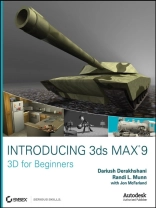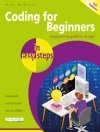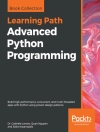Video game and feature-film artists have used 3ds Max to create Halo 2, King Kong, Myst V, and more. Now you can harness thispopular animation software with the clear, step-by-stepinstructions in this easy-to-follow guide. This book breaks downthe complexities of 3D modeling, texturing, animating, and visualeffects. Clear-cut explanations, tutorials, and hands-on projectshelp build your skills and a special color insert includesreal-world examples from talented 3ds Max beginners.Note: CD-ROM/DVD and other supplementary materials arenot included as part of e Book file.
Jadual kandungan
Introduction xii Chapter 1 Basic Concepts 1How to Read This Book 2What Is CGI? 2Production Workflow 4CG Workflow 8CG Specialties 12Core Concepts 14Coordinate Systems 22Basic Animation Concepts 23Basic 3ds Max Terms and Concepts 27Summary 30Chapter 2 Your First Max Animation 31Getting Around in 3ds Max 32Project and File Management Workflow 32The 3ds Max Interface 35Jumping Headlong into Animation 41Setting Up the Hierarchy 52Summary 59Chapter 3 The 3ds Max Interface 61What Am I Looking At? 62Managing Scene Objects 96Summary 103Chapter 4 Modeling in 3ds Max: Part I 105Planning Your Model 106Modeling Concepts 107Look at the Mesh You Got Us Into! 119Editable Poly Tools 129Modeling a Chest of Drawers 137Modeling a Hand 164Summary 177Chapter 5 Modeling in 3ds Max: Part II 179Setting Up the Scene 180The Editable Poly Tools 184Lofting the Barrel 206Lathing the Wheels 215Using Snapshot to Create the Tracks 217Summary 223Chapter 6 Organic Poly Modeling 225Setting Up the Scene 226Creating the Basic Form 231Adding Detail 254Final Touches 271Summary 273Chapter 7 Materials and Mapping 275Materials 276The Material Editor 278Mapping a Pool Ball 294Mapping, Just a Little Bit More 302Maps 305More Mapping Exercises 309Mapping Coordinates 315Summary 323Chapter 8 Introduction to Animation 325Hierarchy in Animation: The Mobile Redux 326Using Dummy Objects 330Bouncing Ball 333Using the Track Editor-Curve Editor 335Track View 350Anticipation and Momentum in Knife Throwing 354Summary 364Chapter 9 Character Studio and IK Animation 365Character Animation 366Character Studio Workflow 366Creating a Biped 368Animating a Biped 376Associating a Biped to a Character 391Using Inverse Kinematics 399Summary 404Chapter 10 3ds Max Lighting 405Basic Lighting Concepts 406Three-Point Lighting 4083ds Max Lights 411Common Light Parameters 425Ambient Light 432Creating Shadows 432Atmospheres and Effects 438Light Lister 442Summary 443Chapter 11 3ds Max Rendering 445Rendering Setup 446Motion Blur 455Previewing with Active Shade 457Cameras 457Safe Frame 462Render Elements 463Rendering Effects 466Raytraced Reflections and Refractions 470Summary 477Chapter 12 Particles and Dynamics 479Understanding Particle Systems 480Setting Up a Particle System 484Particle Systems and Space Warps 499Using Rigid Body Dynamics 504Using Soft Body Dynamics 511Summary 514Index 515
Mengenai Pengarang
Dariush Derakhshani is an award-winning 3D animator, author, and educator. He has worked on movies such as The Fantastic Fourand Pan’s Labyrinth, the South Park TV series, andnumerous commercials and music videos. He teaches 3D animation andis the author of Introducing Maya 7: 3D for Beginners(Sybex).Randi L. Munn teaches 3D animation at The Art Instituteof California and has worked as a digital artist and technicaldirector for games and movie projects with Gizmo Games, RJBEnterprises, and Sony.












